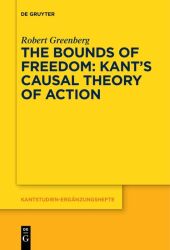 Neuerscheinungen 2018Stand: 2020-02-01 |
Schnellsuche
ISBN/Stichwort/Autor
|
Herderstraße 10
10625 Berlin
Tel.: 030 315 714 16
Fax 030 315 714 14
info@buchspektrum.de |

Robert Greenberg
The Bounds of Freedom: Kant´s Causal Theory of Action
2018. XXII, 123 S. 230 mm
Verlag/Jahr: DE GRUYTER 2018
ISBN: 3-11-061175-9 (3110611759)
Neue ISBN: 978-3-11-061175-5 (9783110611755)
Preis und Lieferzeit: Bitte klicken
In der Reihe werden herausragende monographische Untersuchungen und Sammelbände zu allen Aspekten der Philosophie Kants veröffentlicht, ebenso zum systematischen Verhältnis seiner Philosophie zu anderen philosophischen Ansätzen in Geschichte und Gegenwart. Veröffentlicht werden Studien, die einen innovativen Charakter haben und ausdrückliche Desiderate der Forschung erfüllen. Die Publikationen repräsentieren den aktuellsten Stand der Forschung.
In der Reihe werden herausragende monographische Untersuchungen und Sammelbände zu allen Aspekten der Philosophie Kants veröffentlicht, ebenso zum systematischen Verhältnis seiner Philosophie zu anderen philosophischen Ansätzen in Geschichte und Gegenwart. Veröffentlicht werden Studien, die einen innovativen Charakter haben und ausdrückliche Desiderate der Forschung erfüllen. Die Publikationen repräsentieren damit den aktuellsten Stand der Forschung.
This series publishes outstanding monographs and edited volumes that investigate all aspects of Kant´s philosophy, including its systematic relationship to other philosophical approaches, both past and present. Studies that appear in the series are distinguished by their innovative nature and ability to close lacunae in the research. In this way, the series is a venue for the latest findings in scholarship on Kant.
This monograph is a new interpretation of Kant´s àtemporal conception of the causality of the freedom of the will. The interpretation is based on an analysis of Kant´s primary conception of an action, viz., as a causal consequence of the will. The analysis in turn is based on H. P. Grice´s causal theory of perception and on P. F. Strawson´s modification of the theory. The monograph rejects the customary assumption that Kant´s maxim of an action is a causal determination of the action. It assumes instead that the maxim is definitive of the action, and since its main thesis is that an action for Kant is to be primarily understood as an effect of the will, it concludes that the maxim of an action can only be its logical determination. Kant´s àtemporal conception of the causality of free will is confronted not only by contemporary philosophical conceptions of causality, but by Kant´s own complementary theory of causality, in the Second Analogy of Experience. According to this latter conception, causality is a natural relation among physical and psychological objects, and is therefore a temporal relation among them. Faced with this conflict, Kant scholars like Allen W. Wood either reject Kant´s àtemporal conception of causality or like Henry E. Allison accept it, but only in an anodyne form. Both camps, however, make the aforementioned assumption that Kant´s maxim of an action is a causal determination of the action. The monograph, rejecting the assumption, belongs to neither camp.


